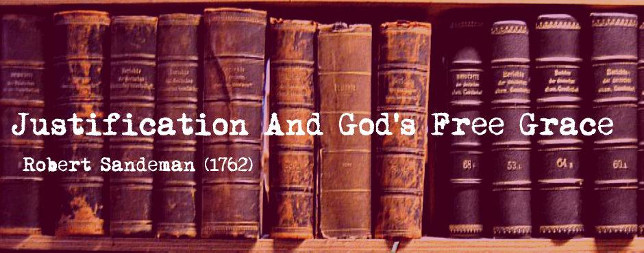By Robert Sandeman1
It is affirmed in the subscribed standards of orthodoxy, that justification is an act of God's free grace. This affirmation is well supported by the New Testament, which likewise affirms, that God justifies the heathen through, or by faith, even as one illuminates a dark room by introducing a candle. If the reader doubts the propriety of this similitude, he may take a grander one from Paul, who says, "God who commanded the light to shine out of darkness, hath shined in our hearts, to give the light of the knowledge," &c. To the same purpose that Apostle also says, "By grace are ye saved through faith; and that not of yourselves; it is the gift of God: not of works, lest any man should boast; for we are his workmanship, created in Christ Jesus unto good works." And James says, "Do not err, my beloved brethren. Every good gift, and every perfect gift, is from above, and cometh down from the Father of lights," &c. ... " Of his own will begat he us by the word of truth." These, with many like passages clearly solve all questions about the instrumentality of faith in justification, or by whose agency men attain to that justification which is by faith.
Now, readers, after you have heard the orthodox so plainly affirming, that justification is an act of God's free grace, and the Scripture so clearly supporting that affirmation, suffer them not to put the change upon you. Beware of their circumlocutions. Whenever they begin to talk to you of any act you are to exert in order to acceptance, and to call it a justifying act, which you arc to exert by the help of God's grace, be you ready to reply, avaunt; none of your tricks. You have already asserted, and we hold you fast by this assertion, that justification is an act of God's free grace.
Remember also, that the teachers of orthodoxy call themselves preachers of the gospel, and that the word gospel is allowed to signify good news, or glad tidings ; which you know, in every other case, gladden the heart so soon as they are understood and known to be true. Whenever, then, they begin to tell you of any pious act necessary in order to acceptance, you can immediately reply, this is no news, for Moses long ago told us our duty, assuring us of happiness in our compliance: neither is it glad tidings to us in our present circumstances If, then, you would preach gospel to us, you must tell us something fit to give us joy, as we presently stand unconscious of any distinguishing qualification.
July, 1762.
1From the Appendix to the Third Edition of Robert Sandeman, Letters on Theron and Aspasio. 4th Edinberg Edition. New York: John S. Taylor, 1838: 499-500.
